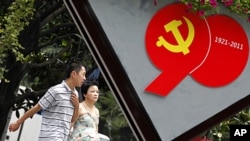China's ruling Communist Party says it is stepping up its fight against worsening corruption among its members. The party's vice chairman for discipline, Wu Yuliang, said Wednesday officials would come under closer scrutiny and supervision. The announcement follows the creation of new independent online tools aimed at helping the public anonymously report corrupt officials.
The ruling Communist Party of China says it will start to monitor the use of vehicles by officials and scrutinize their finances in the latest campaign to clamp down on rampant corruption found at every level of government.
Threatens stability
China's central government views corruption as a major threat to political stability, and the party's vice chairman for discipline, Wu Yuliang, told journalists Wednesday the practice is blocking the path of the country's economic development. Wu said the party welcomes the public's involvement in supervising officials. But he indicated the party prefers to handle the problem without the help of new, independent websites that allow the public to report corrupt officials.
Wu says the party must severely punish those who violate Party discipline and prevent officials from gaining power and money through corrupt business activities.
He says the independent graft-busting websites has had a negative impact on the government's anti-corruption initiatives.
The vice chairman for disciple said the party will guide citizens to express their appeals in what he describes as the "right way."
Whistleblower website
The Associated Press interviewed one man, who did not want to be named, who created a website named ibribery.com (down at time of publication) where people can anonymously report clues and sources of information about corruption they have witnessed.
The man says that when people report corruption to the government, they do not get a response.
He says anti-vice officials promise to look into complaints, but he describes the procedures as inefficient.
The ibribery website is not yet accessible inside China because it is still applying for an operating license. But other unofficial websites are proving popular with a disgruntled public.
The Chinese government has launched numerous efforts to curb graft, and yet bribery and other illegal activities remain common among Communist Party officials.
Such behavior angers ordinary Chinese and sparks protests, which are growing in number and rattle the country's leaders.
Earlier this year the high-ranking railways minister, Liu Zhijun, was arrested for allegedly embezzling $121 million and receiving huge bribes when handing out contracts for the country's showcase high-speed rail network.
Prior crackdown
A 2009 crackdown exposed deep links between government officials and police officers who provided cover for crime syndicates in the southwestern megacity of Chongqing.
The director of the city's judicial department, Wen Qiang, was executed for bribery, rape, extortion and organized crime gang-related activities.
Just last week, the central People's Bank of China released a report saying as many as 18,000 corrupt mainland officials may have fled the country with more than $120 billion in ill-gotten gains during the past two decades.
Wu says the numbers in the report were "incorrect," but that officials are working on measures to prevent corrupt officials from fleeing the country.
China's Communist Party Announces More Crackdowns on Corrupt Officials




